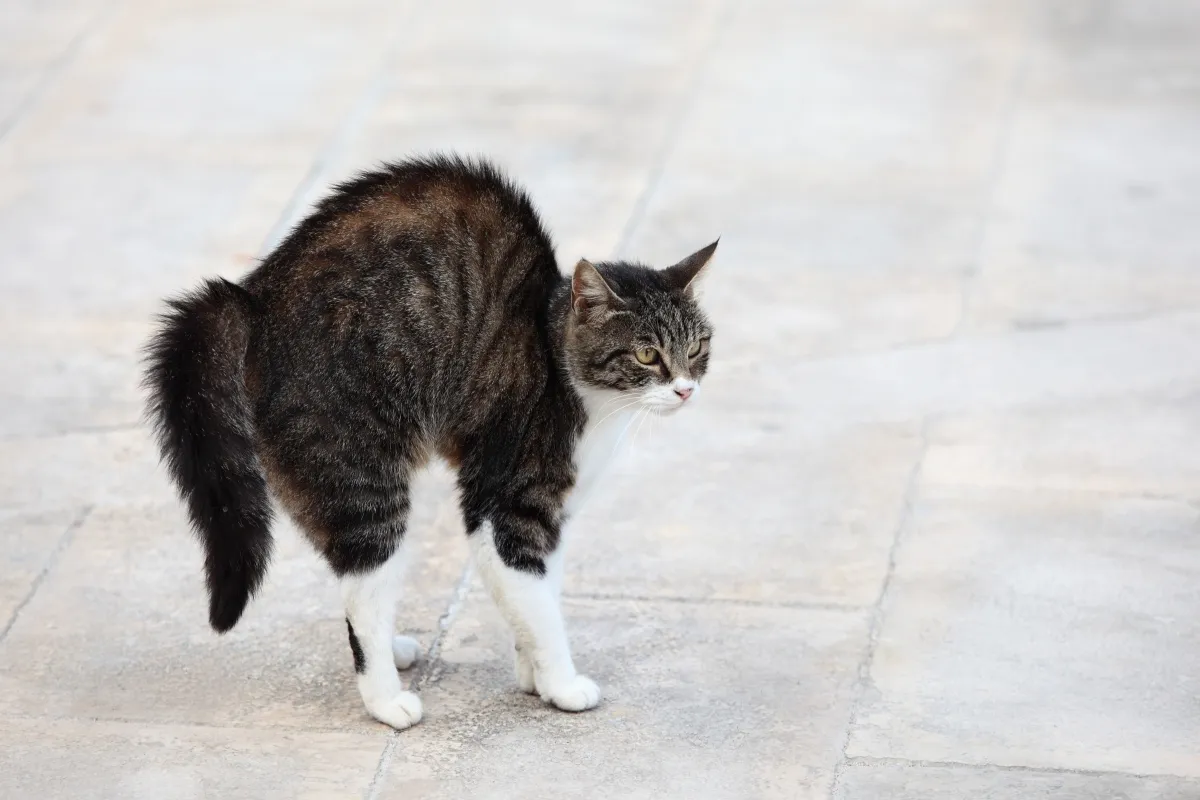Table of Contents
Imagine you are giving your sweet feline companion some chin scratches and cuddles when he suddenly lashes out and swats your hand away. Understandably, you’re taken aback as to why your sweet boy would switch moods so quickly and wonder what caused the change. Although startling, this is a fairly common occurrence among cat parents. Cats are inherently unpredictable animals.
Sometimes cats just need their space, while other times, an underlying medical condition could be causing the aggressive behavior. Because there are many reasons for a cat to suddenly display aggression, it is important to consult with a veterinarian if you notice behavioral changes in your cat.
Why Is My Cat Suddenly Aggressive?
Cats may suddenly display aggressive behavior for many reasons. Underlying health conditions and environmental factors are two of the most common causes pet parents should be aware of. Any time a normally gentle cat becomes unusually aggressive, it should be taken seriously.
Underlying Health Conditions
Cats who are in pain are more likely to become aggressive unexpectedly. If your cat is experiencing signs of aggression, it is important to bring him to the veterinarian for a checkup to rule out underlying medical conditions. A veterinarian can perform a physical exam, take a detailed history, and run diagnostic testing to determine a cause.
Defensive Mechanism
If a cat feels threatened in his environment, he may lash out as a defense mechanism. Certain factors that may elicit these feelings include the following:
- Predators
- Lack of resources
- Conflict with other household pets
- Anxiety or fear
- Changes in the environment (moving, new baby, etc.)
Dominance
Some cats want to display dominance. This is especially common in multi-cat households. To create their ideal hierarchy, cats may attempt to intimidate housemates through aggressive body language, such as hissing, pouncing, and nudging.
Overstimulation
Cats can become overstimulated and fail to regulate their emotions well. This can occur when being pet, hearing loud noises, chasing prey, or exploring a new environment. Overstimulation can lead to aggression if early warning signs are not noticed by the cat parent. This is very common in households with small children who like to repeatedly touch their pet cats and may not notice if they are beginning to feel agitated.
Temperament
Sometimes, cats can simply be temperamental. Like people, there are times when a cat may just want to be left alone. This may be obvious when you are petting your cat, and he seems to be enjoying it one moment and then becomes aggressive the next. If this occurs, giving your cat space and time to decompress usually resolves the issue.
Signs of Impending Aggression in Cats
Fortunately, before a cat becomes aggressive, there are a few warning signs pet parents can watch for. The most common signs of impending aggression in cats include the following:
- Pinned back ears
- Raised fur
- Tense, crouched posture
- Enlarged pupils
- Hissing
- Flicking tail
- Batting paws
As a cat becomes increasingly agitated, these early signs will progress to full-blown aggression. Cats may scratch, bite, or bat at the person or animal that is causing them distress.
Helpful Tips to Prevent Aggression in Cats
Implementing preventative measures against aggression in cats depends on the underlying cause. If your cat is experiencing stress, making changes to his environment can be helpful. Ensure your cat has a private space away from other household pets and people so that he can relax. Ensure he is receiving plenty of mental and physical stimulation throughout the day through toys and vertical climbing space to prevent boredom. Adding pheromone diffusers to your cat’s designated area can also promote a calming atmosphere.
However, if your cat displays other abnormal signs, such as inappropriate urination, crying out, or hiding, his aggressive demeanor could indicate an underlying health condition that needs to be managed by a veterinarian to help him feel better.
Most importantly, if your cat is showing signs of aggression, give him space. Do not try to touch or pick him up because he will likely become further agitated and may bite or scratch you. Allow him some time to calm down and then revisit the situation.
When in Doubt, Visit the Veterinarian
If you are ever in doubt about why your cat is suddenly acting aggressively, schedule an appointment with a veterinarian. Your cat will receive an exam and diagnostic testing to determine the root cause so that appropriate treatment can be started.
Once an underlying health condition has been ruled out, your veterinarian may recommend speaking with a behaviorist who can identify why the aggression is occurring and provide helpful tips to reduce and prevent these unwanted behaviors.






